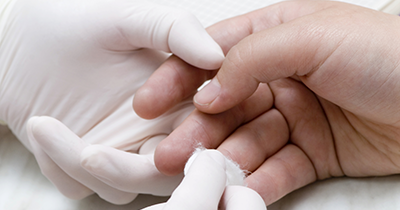HIV Testing in Nonclinical Settings

HIV testing can be done in a variety of nonclinical or community-based settings, as well as outreach sites, or in a person’s home. Nonclinical settings are easy to access and useful for people who might not be willing or able to access medical services regularly. Nonclinical settings typically provide same-day rapid HIV testing and might offer other HIV prevention services. They may also do outreach and recruitment to get high-risk populations in for HIV testing. Offering HIV testing in these settings is an effective way to bring HIV testing to the community. This section provides key references and information for persons conducting HIV testing in nonclinical settings.
CDC Guidance on HIV Testing in Nonclinical Settings
CDC issued program guidance for HIV testing providers called Implementing HIV Testing in Nonclinical Settings: A Guide for HIV Testing Providers. This guide supports the implementation of HIV testing services in nonclinical settings in the United States. The purpose of the guide is to familiarize providers with key programmatic issues that impact delivery of HIV testing services in nonclinical settings. Although this guidance is intended for CDC-funded nonclinical HIV testing providers, non-grantees may also find the content useful.
Job Aids to Support Implementing HIV Testing in Nonclinical Settings
- Protocol Cards for HIV Testing with Individuals in Nonclinical Settings
- Provider Flip Card for HIV Testing with Individuals in Nonclinical Settings
- Scripts for HIV Testing with Individuals in Nonclinical Settings
- Protocol Cards for HIV Testing Together (Couples) in Nonclinical Settings
- Provider Flip Card for HIV Testing Together (Couples) in Nonclinical Settings
- Scripts for HIV Testing Together (Couples) in Nonclinical Settings
- Frequently Asked Questions about Implementing HIV Testing in Nonclinical Settings
Implementing HIV Testing in Nonclinical Settings: A Guide for HIV Testing Providers complements the document Planning and Implementing HIV Testing and Linkage Programs in Nonclinical Settings: A Guide for Program Managers, and the Evaluation Guide for HIV Testing and Linkage Programs in Nonclinical Settings, which are both intended for HIV program managers.
Laboratory Certificate Requirements for HIV Testing in Nonclinical Settings

Nonclinical HIV testing sites using waived rapid HIV tests must either obtain their own certificate of waiver under the Clinical Laboratory Improvement Amendments of 1988 (CLIA) or establish an agreement to work under the CLIA certificate of an existing laboratory. CLIA outlines quality standards for laboratory testing—including rapid HIV testing—to ensure the accuracy, reliability, and timeliness of patient test results. Agencies should contact their state or local health department for more information, including how to apply for a CLIA waiver. More information about CLIA certification and CLIA-waived tests, including how to establish a CLIA-waived HIV testing site, can be found on CDC’s website at the following links:
- CDC CLIA home page
- CDC CLIA of Certificate Waiver Fact Sheet
- State agency & regional office CLIA contacts
- How to establish an Individualized Quality Control Plan (IQCP) for HIV-CLIA waived testing
- Additional resources for setting up a nonclinical testing site
HIV Testing Technologies
- CLIA-waived rapid HIV tests
- Guidance for nonclinical HIV testing sites that use a laboratory-based algorithm
- Alere Determine™ HIV-1/2 Ag/Ab Combo Information Sheet for Testing Programs
- CDC’s Rapid HIV Testing Online Training Course
Related Recommendations and Guidelines
- HIV recommendations and guidelines
- STD & HIV Screening Recommendations
- Hepatitis C Virus testing information
- Recommendations for Partner Services Programs for HIV Infection, Syphilis, Gonorrhea, and Chlamydial Infection
- Partner Services Providers Quick Guide
Journal Articles
Acute HIV Infection
- Screening yield of HIV antigen/antibody combination and pooled HIV RNA testing for acute HIV infection in a high-prevalence population. JAMA 2016.
- Estimating per-act HIV transmission risk: A systematic review. AIDS 2014.
Home-Based HIV Self-Testing
- HIV self-testing: A review of current implementation and fidelity. Curr HIV/AIDS Rep 2016.
- Acceptability and feasibility of HIV self-testing among transgender women in San Francisco: A mixed methods pilot study. AIDS Behav 2016.
- HIV-negative partnered men’s attitudes toward using an in-home rapid HIV test and associated factors among a sample of US HIV-negative and HIV-discordant male couples. Sex Transm Dis 2015.
Linkage and Referral
- Optimizing human immunodeficiency virus testing interventions for men who have sex with men in the United States: A modeling study. Open Forum Infect Dis 2015.
Prevention Counseling and HIV Testing
Targeting and Recruitment
- Comparison of strategies to increase HIV testing among African-American gay, bisexual, and other men who have sex with men in Washington, DC. AIDS Care 2014.
Testing Couples Together for HIV
- Are couple-based interventions more effective than interventions delivered to individuals in promoting HIV protective behaviors? A meta analysis. AIDS Care 2015.
- Risk of intimate partner violence and relationship conflict following couple-based HIV prevention counseling: Results from the harlem river couples project. J Interpers Violence 2015.
- Technical assistance needs for successful implementation of couples HIV testing and counseling intervention for male couples at US HIV testing sites. AIDS Behav 2015.
- The prevalence of undiagnosed HIV serodiscordance among male couples presenting for HIV testing. Arch Sex Behav 2014.
Testing Technologies and Approaches
- Time until emergence of HIV test reactivity following infection with HIV-1: Implications for interpreting test results and retesting after exposure. Clin Infect Dis 2017.
- Performance of determine combo and other point-of-care HIV tests among Seattle MSM. J Clin Virol 2016.
- Using a multitest algorithm to improve the positive predictive value of rapid HIV testing and linkage to HIV care in nonclinical HIV test sites. J Acqir Immune Defic Syndr 2016.
- Assessment of oral fluid HIV test performance in an HIV pre-exposure prophylaxis trial in Bangkok, Thailand. PLoS ONE 2015.
- Page last reviewed: September 7, 2017
- Page last updated: September 7, 2017
- Content source: Division of HIV/AIDS Prevention, National Center for HIV/AIDS, Viral Hepatitis, STD, and TB Prevention, Centers for Disease Control and Prevention


 ShareCompartir
ShareCompartir